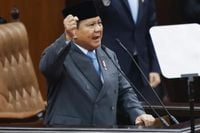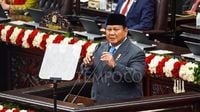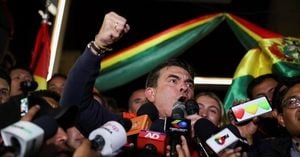In a week marked by celebration and reflection, Indonesia’s President Prabowo Subianto took center stage as the nation commemorated its 80th year of independence. Against a backdrop of festivity and hope, Prabowo delivered a series of bold addresses to parliament and the people, outlining his vision for a united, prosperous, and corruption-free Indonesia. The president’s speeches, packed with promises, statistics, and a touch of defiance, set the tone for a new era—one where economic growth, social welfare, and clean governance are no longer lofty ideals but actionable priorities.
Prabowo’s first State of the Nation Address on August 15, 2025, was nothing short of fiery. According to the Manila Times, he didn’t mince words about the challenges facing the world’s fourth most populous country. “I have a deeper understanding of the magnitude of the challenges we face and the extent of corruption within our government,” Prabowo declared, capturing the attention of parliamentarians and citizens alike. He revealed that his administration had identified and saved approximately 300 trillion rupiah—about $18.5 billion—from the state budget that might otherwise have been lost to corruption, including from seemingly mundane sources like government travel and office supplies.
Corruption, Prabowo said, remains endemic in Indonesia. The country’s anti-graft commission, the KPK, has arrested hundreds of officials since its founding in 2003, including 133 regents and mayors, 18 governors, 83 parliament members, and 12 ministers. Indonesia’s ranking—99th out of 180 nations in the 2024 Corruption Perceptions Index, as reported by Transparency International—underscores the scale of the challenge. Yet, Prabowo struck a combative tone, vowing, “As long as I’m president, never assume that the great and the rich can do whatever they want. We are not afraid of your greatness or wealth. The government that I lead will not hesitate to defend the interests of the Indonesian people.”
But corruption wasn’t his only target. Prabowo also took aim at food cartels and illegal mines, phenomena he said have bled billions from the state and disadvantaged ordinary Indonesians. He coined the term “serakahnomics”—a blend of “economics” and the Indonesian word for greed, “serakah”—to describe the behavior of food cartels causing up to $6.1 billion in losses annually. He criticized rice mills for buying farmers’ crops below the government-set price, profiting handsomely while rural communities struggled. “There are some business people who use their capital power to dominate and manipulate the lives of the people at the bottom, and we cannot accept this,” Prabowo insisted.
Illegal mining, too, was in his crosshairs. Reports indicate that more than 1,000 illegal mines could cost the state at least another 300 trillion rupiah ($18.5 billion). The government, Prabowo said, had already regained control of 3.1 million hectares of palm oil plantations out of 5 million that were reportedly managed illegally. “We are facing the reality of a massive leakage of our nation’s wealth, we are in a net outflow of national wealth condition,” he observed, framing his anti-corruption and anti-cartel crusades as essential to Indonesia’s future.
Yet, the president’s vision for Indonesia extends beyond rooting out corruption. In his address, as reported by AFP, Prabowo highlighted Indonesia’s economic resilience and ambitious social initiatives. He pointed to a second-quarter economic growth rate of 5.12 percent—up from 4.87 percent in the previous quarter—despite the headwinds of global conflict and trade wars. “Amid political conflict, global economic conflict, (and the US) trade war... Indonesia still managed to grow above five percent,” Prabowo told parliament, referencing a hard-fought negotiation with the United States that reduced tariffs on Indonesian goods from 32 percent to 19 percent in April 2025.
On the social welfare front, Prabowo defended his government’s billion-dollar free meal program for schoolchildren and pregnant mothers, which he said has reached 20 million people. “Our goal... is to be free from poverty, free from hunger, free from suffering,” he said, even as the program drew criticism over funding cuts, delays, and isolated incidents of food poisoning. The president’s willingness to stand by the initiative, despite protests and fiscal pressures, signals his commitment to tackling Indonesia’s persistent challenges with childhood stunting and malnutrition.
Unemployment, another key metric, was the subject of both celebration and scrutiny. During his speech at the Annual Session of the People’s Consultative Assembly on August 15, Prabowo claimed, “Alhamdulillah, today the national unemployment rate has dropped to the lowest level since the 1998 crisis.” Data from the Central Statistics Agency (BPS), cited by TEMPO.CO, confirm that the open unemployment rate in February 2025 stood at 4.76 percent—a slight decrease from the previous year and the lowest since the Asian financial crisis. However, the story isn’t quite so simple. Qisha Quarina, a lecturer at Gadjah Mada University, cautioned that the absolute number of unemployed people had actually increased, from 7.2 million in February 2024 to 7.28 million in February 2025. “Our main problem is not just about having a job or not, but also about having decent work,” she explained, warning that statistical improvements might mask deeper labor market issues.
Moreover, Indonesia’s unemployment rate remains the highest among six major ASEAN economies, according to International Monetary Fund data. At 5 percent in April 2025, it outpaces the Philippines (4.5 percent), Malaysia (3.2 percent), Singapore and Vietnam (both at 2 percent), and Thailand (1 percent). This regional comparison tempers the government’s optimism and highlights the need for continued reform and job creation.
Throughout these pivotal days, influential civil society voices weighed in. Muhammadiyah, one of Indonesia’s largest Islamic organizations, praised Prabowo’s political will to develop quality human resources and advance the government’s eight priority goals, known as Astacita. Speaking on August 16, Muhammadiyah’s Haedar Nashir reminded the nation that independence is not just a yearly ritual but a historical mandate to advance education and the economy. He called on millennials and Gen Z to carry Indonesia’s struggle forward in an increasingly complex world, and urged government elites to make the constitutional mandate their guiding star. “The people’s mandate is not a means for self-enrichment but a call to serve,” Nashir said, emphasizing the need for concrete action from all levels of government.
The week’s events culminated in a renewed sense of purpose as Indonesia marked its 80th anniversary with the theme: “united, sovereign, prosperous, and advanced Indonesia.” As Prabowo unveiled his 2026 budget and charted a course for the future, the challenges of corruption, inequality, and joblessness loomed large. Still, the president’s bold vision, combined with the vigilance of civil society, suggests a nation determined to turn the promise of independence into tangible progress for all its people.





